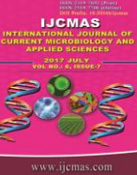


 National Academy of Agricultural Sciences (NAAS)
National Academy of Agricultural Sciences (NAAS)

|
PRINT ISSN : 2319-7692
Online ISSN : 2319-7706 Issues : 12 per year Publisher : Excellent Publishers Email : editorijcmas@gmail.com / submit@ijcmas.com Editor-in-chief: Dr.M.Prakash Index Copernicus ICV 2018: 95.39 NAAS RATING 2020: 5.38 |
Alternative water sources for potable or non-potable purposes are now sought as a result of the global crisis of water shortage and rainwater harvesting is one of the several strategies for mitigating the growing water crisis. However, one of the primary issues regarding the use of rainwater is quality. The objective of this study therefore was to examine the combined effects of storage duration and materials on the physico-chemical and microbiological qualities of harvested rainwater in Ogbomoso, southwestern Nigeria. Samples of harvested rainwater were kept in three different storage materials, namely metal drum (M), plastic drum (P) and earthen pot (E) for one day (D1), five days (D5) and ten days (D10) before analysis for quality indicators of physical, chemical and biological characteristics. Storage material had significant effect on the quality indicators except temperature, chloride (Cl) and nitrite (NO2)with earthen pot most significantly influencing the quality of the harvested rainwater. Except for temperature, total solids (TS), nitrate (NO3) and total coliform (TC), storage duration did not significantly affect the quality indicators. As the storage duration increases, the introduction of contaminants increased the electrical conductivity (EC), TS and TC. There was significant correlation between the harvested rainwater quality indicators and of all the quality indicators, only changes in water temperature and chloride can be best predicted over time. This study shows that harvested rainwater for potable purposes should not be stored more than five days without adequate treatment and the use of plastic drum is recommended for storing rainwater. Nevertheless, care must be taken when storing rainwater from the introduction of foreign contaminants while proper handling must be ensured.
 |
 |
 |
 |
 |